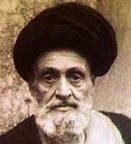February 3, 1954 — United Press [UP]
| The Mossadegh Project | August 5, 2013 |
 A profile of Ayatollah Seyed Abolghassem Kashani from United Press — Wednesday, February 3, 1954.
A profile of Ayatollah Seyed Abolghassem Kashani from United Press — Wednesday, February 3, 1954.
Other headlines for this piece included:
Spidery Little Man Threatens To Upset Iran Government
Spidery Little Iranian Pops Up In News Again
Name of Spidery Little Man Shows Up To Threaten Iran Settlement
Iranís Spidery Little Terrorist
Fanatic Perils Accord in Iran
Religious Leader Attacks Agreement
Religious Leader Attacks Iranian-British Agreement
Iranian Religious Leader In Threat To Oust Government
Powerful Religious Leader Threatens Rebellion in Iran
Gang Leader Kashani Proves Iranian Threat
Kashani Is Wily Figure In Iran Issue
Wily Little Terrorist Aims
To Overthrow Iran Premier
United Press Foreign News Editor
A spidery little man whose name is synonymous with terrorism and assassination comes up in the news again this week from Iran.
He is Seyed Ayatollah Kashani whose authority springs from his position as Iranís most powerful religious leader and from his street gangs which roam Tehranís bazaar and the twisted streets of the old town behind it.
Now he threatens to overthrow the government of Premier Fazlollah Zahedi which is about to reach final agreement with Britain in the long dispute over Iranian oil.
It is not likely he can make good his threat but it would be wrong to count out this wily little man who at an indeterminate age somewhere between 70 and 80 already has been sentenced to death once, jailed three times and exiled three times.
Kashani hates all Western influence and he centers his hatred on the British whom he blames for the death of his own father.
His present threat against the government is another supreme effort to prevent any agreement with Britain and in a broader sense with the whole Western world.
It makes little or no difference to Kashani that without agreement Iran eventually must go bankrupt and probably fall to the Communists.
Equally, he cares for Iranian nationalism because his dream is of a far greater Islamic state and he believes the people can be wooed from Communism just as he would lead them from the West.
Efforts to settle the dispute between Britain and Iran are closer to success now than at any time since Iran seized the British-owned Anglo-Iranian Oil Co. and nationalized the oil industry in March, 1951.
In the meantime, a government has fallen, the Shah was driven from his country only to make a triumphal return and the issue of Iranian oil has become global, involving the World Court at the Hague, the courts of Japan and Italy and the worldís great oil companies.
Iranís oil was seized and nationalized by the deposed former premier, Mohammed Mossadegh, who now has been convicted of treason and accused of leaving the Iranian government with a $500,000,000 deficit despite stop-gap aid from the United States.
The man receiving much of the credit for bringing the two sides together where others failed is Herbert Hoover Jr., son of the former United States President.
Before the decision to nationalize her oil, Iran received from Anglo-Iranian about $112,000,000 a year. It represented a major portion of her income and the great bulk of her foreign exchange.
But meantime conditions have changed. Other sources have filled the gap left when Iranian oil went off the world market. Thatís why eight major oil companies, including five American, have been meeting in London in a move which actually would reapportion the world market.
And before the American companies could participate, it was necessary for the Justice Department to rule that they would not be prosecuted under the U.S. antitrust laws.
It is into that situation that the ancient Kashani has injected himself again, possibly in a deliberate move to invite arrest and make of himself a martyr.
Related links:
Iran Shah May Be Ousted — Inside Washington, October 22, 1952
Ahmadinejad Credits Clerics With Oil Nationalization (March 2012)
Terror in Iran — The Knickerbocker News, August 9, 1952
MOSSADEGH t-shirts — ďIf I sit silently, I have sinnedĒ




